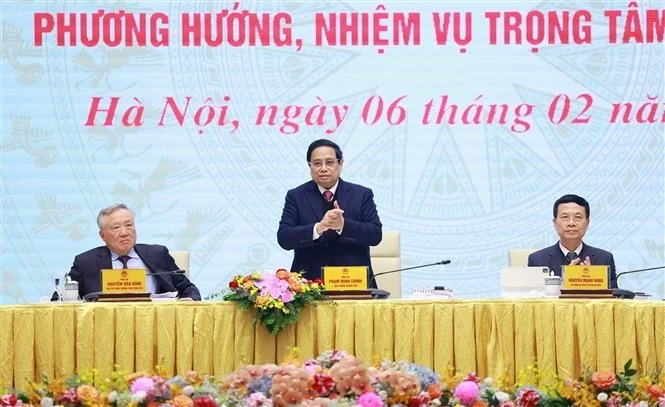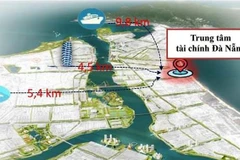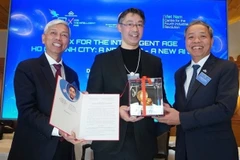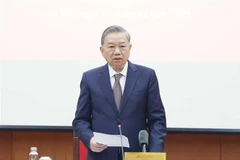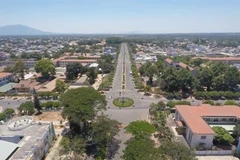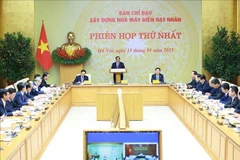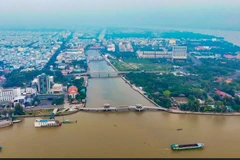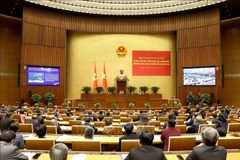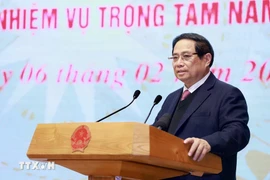Hanoi (VNA) – Immediate actions must be taken so that all administrative procedures for foreigners in Vietnam will be carried out through online public services, Prime Minister Pham Minh Chinh ordered while chairing the 10th nationwide online session of the National Committee for Digital Transformation in Hanoi on February 6.
In his concluding remarks, Chinh, who also serves as the head of the committee, called for streamlining administrative procedures and reducing processing times, and implementing online application methods for visa issuance. He urged the online issuance of identity cards for overseas Vietnamese and birth certificates for Vietnamese children born abroad.
The PM stressed that thanks to the leadership of the Party and the State, the engagement of the entire political system, and the active participation of businesses and citizens, Vietnam’s digital transformation has made significant progress.
He pointed out that Vietnam has so far simplified 898 out of 1,084 administrative procedures nationwide, with all 63 provinces and cities issuing resolutions to waive or reduce fees for citizens and businesses. Leading global tech giants, such as Marvell, NVIDIA, and SK Hynix, are investing and expanding their presence in the country. Meanwhile, e-commerce continues to thrive, digital infrastructure is being strengthened, and the national population database and online public services are increasingly improved.
PM Chinh requested that digital transformation go hand in hand with administrative reforms, be in line with current trends, and meet public demands. He underscored science, technology, and innovation as strategic choices and top priorities for Vietnam’s rapid and sustainable development in the digital era. People and businesses should remain at the centre of all efforts, the leader added.
He urged authorities to accelerate comprehensive digital transformation for double-digit economic growth in the coming years, the digitisation of industries for better productivity and competitiveness, and the development of digital infrastructure, a skilled digital workforce, and e-government.
By June 2025, leaders of all ministries, sectors, and localities must direct, manage, and handle tasks in a digital environment and use digital signatures, Chinh directed. By the end of the year, all commune-, district-, and provincial-level officials and civil servants must process tasks digitally and use digital signatures.
He also urged the development of an Internet of Things (IoT) application project in many sectors – including manufacturing, commerce, energy, smart agriculture, smart transportation, and smart healthcare – and of a digital transformation project for businesses, tied to the creation of criteria for assessing corporate digital transformation levels. The national data centre must be operational within 2025, the PM asked.
Chinh went on setting a six-month deadline for key ministries to implement digital initiatives. Accordingly, the Ministry of Finance must ensure electronic payments for food and beverage services, while the Ministry of Health must complete the implementation of electronic medical records. The Ministry of Education and Training has to establish a comprehensive student database; the Ministry of Justice complete the judicial record database; and the State Bank of Vietnam direct the offering of digital financial services for individuals and businesses
At the event, it was noted that in the past year, Vietnam's digital government initiatives expanded significantly. The nationwide rate of full-process online administrative records reached 45%, a 2.5-fold increase compared to 2023. Vietnam climbed 15 places to rank 71st out of 193 countries in the United Nations' e-government development index. The country’s digital economy accounted for an estimated 18.3% of GDP, with a growth rate exceeding 20% per year, three times faster than GDP growth – the fastest rate in Southeast Asia.
Despite these achievements, challenges remain. There are slow implementation and weak interconnectivity of databases, cyber fraud and high-tech crimes becoming more complex, and a shortage of skilled digital and IT professionals, among many other issues.
This year, the national committee plans to focus on accelerating digitalisation across all sectors, contributing to the economic growth target of 8-10%.
On this occasion, PM Chinh, Permanent Deputy PM Nguyen Hoa Binh, and leaders of ministries and central agencies participated in an activation ceremony for Gmedical, a system for healthcare data coordination./.
